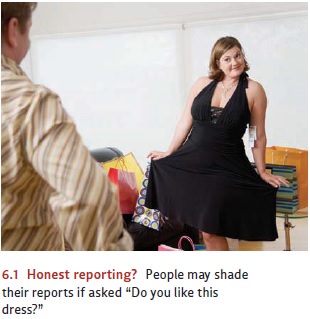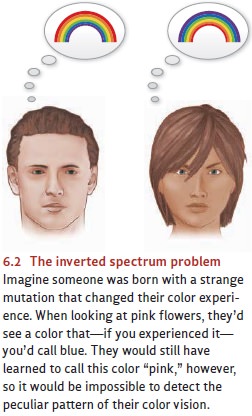Chapter: Psychology: Consciousness
Consciousness: Translating Thoughts into Words
Translating
Thoughts into Words
Introspections are an enormously
valuable source of evidence and are used in formal investigations as well as in
a range of day-to-day settings. But there are many things that we can’t learn
by asking people to introspect. In some cases, this is because introspectors may
choose not to reveal what they’re really thinking. Suppose a friend asks you,
“Does this dress make me look fat?” or “Did you like the pie I baked for

you?” If you put a higher value
on diplomacy than on honesty, your answers will be no and yes—even if that’s
not what you think (Figure 6.1). In other cases, you may want to be honest in
reporting your thoughts and experiences but you simply don’t have the
vocabulary. For example, imagine you’re trying to convey in words exactly what
your mother looks like. You’re likely to fail in this task because most of us
lack the descriptors we might need to capture the exact curve of our mother’s
chin or the precise shape of her eyes. Likewise, imagine that you’ve met some
poor soul who has never eaten chocolate and you’re trying to tell her what
chocolate tastes like. You might mention that it’s sweet, although usually with
bitter overtones; you might mention other foods that taste similar to
chocolate. Despite these efforts, though, you might end up saying, “If you want
to know what chocolate tastes like, you’ll just have to try it for yourself.”
In many other settings, people do
seem able to find words that can convey their thoughts; but there’s still a
problem here, one that philosophers sometimes convey by means of the inverted spectrum: Imagine that some
people are born with a strange mutation that makes their color vision the
inverse of yours. When they look at a ripe tomato, they see a color that—if you
experienced it—you’d call “violet” (Figure 6.2). Their experience when they
look at a banana is the same as the experience that you’d have when looking at
a pair of blue jeans. When they look at a clear sky (one that you would
consider to be blue), they see a color
that—if you experienced it—you would count as yellow.

How could we tell whether someone
has an inverted spectrum? We could—at least in principle—examine the
photopigments in the person’s eyes and the neural response in his visual
cortex. Perhaps those tests would tell us that biologically, his visual system
responds to various wavelengths the same way everyone else’s does. But does
that mean his subjective experience
is the same as ours? To answer this question, we’d need to know exactly how
biological responses translate into subjective experiences—but we don’t.
Therefore, we can’t rely on someone’s biology to tell us if they have an
“inverted spectrum” or not.
We also can’t rely on someone’s behavior to tell us whether he suffers
from this odd visual problem. After all, from a young age, he’d have learned to
call tomatoes red and bananas yellow—just like we do. He would agree that orange and yellow
seem similar to each other (although his inner experience would be what we call
blue and purple). He would agree that certain colors seem to be the opposites
of each other—red and green, for example (although his inner experience would
be what we call violet and green). No matter what test we construct, his
responses to color and descriptions of color will match ours.
The inverted-spectrum problem is
of course a contrived and peculiar case, but similar problems arise in many
other settings. For example, if you say that mosquito bites hurt, and I say they itch, is this because we have different
experiences in response to these bites or because we mean different things by
the word itch? There’s no way to
know. Likewise, if you claim that your headaches are excruciating and I don’t
describe mine that way, does this mean your headaches are worse than mine? Or,
perhaps, do you mean something different by the word excruciating? Again, there’s no way to know.
To put these points more broadly,
the problem here is that conscious experiences are ineffable—an old-fashioned term meaning “utterly indescribable.”
The problem existsnot because people are shy or somehow oblivious to their own
conscious states. Instead, conscious states are ineffable because there’s often
no way to ensure that your words, in describing your conscious experience, mean
the same thing as anyone else’s words. Do you mean the same thing by “blue” as
they do? How about “itchy” or “excruciating”? With no way to answer these
questions, we have to accept that the words themselves will forever be
inadequate as a way of describing consciousness—a profound limitation on what
we can hope to learn from anyone’s self-report.
Related Topics